
When we sleep, we heal.
We know that getting enough sleep is important for good health, but many times it is the first thing we let slide when our “to do” list gets too long. Optimal sleep allows us to be at our best both physically and mentally. Our performance can be affected both mentally and physically with getting just two to three hours less of what is optimal sleep for us per night. Many bodily functions such as brain activity, secretion of hormones and blood pressure rely on our ability to get optimal sleep.
When we talk about sleep we have to look at both the quantity and the quality of sleep. While some sleep issues (sleep apnea, snoring) are more complicated, there are some easy things that we can pay attention to now that will help us get the optimal sleep that we need.
1. Keep it dark
Our pineal gland produces melatonin, the “hormone of darkness”, and our brain begins producing this as day goes into night. Melatonin is an antioxidant that helps protect us against free radicals as well as support the immune system.
Any light that comes from electronic gadgets such as cell phones, clock radios, laptops or tvs can affect the production of melatonin. Mimimize light and the electronic devices.You can control the light in your bedroom by installing blinds or curtains to block the light for sleeping. Darkness tells your body it’s time to rest and repair.
2. Keep the air clean
How clean is the air in your bedroom? What cleaning products are used in your room?
Keep the air clean with natural cleaning products and an air purifier. Open your windows occasionally to allow fresh air in. Change the filters on your air conditioning every 1-3 months. Use low toxicity paint on your bedroom walls. And yes, change your sheets weekly and wash them in hot water to get rid of the dust mites and allergens. Many times the air outside of our homes is cleaner than the inside.
3. Stay cool
What temperature is your bedroom? Most research says the cooler the better, and by cool we mean around 68 degrees. A slight drop in temperature, even one or two degrees, can help induce sleep, and save money on energy costs. Experiment with the temperature of your bedroom for your comfort level and the quality of your sleep.
4. Exercise helps
Exercise helps to reduce stress, relax muscles and clear the mind, which will prepare us for sleep. Try not to exercise right before sleep as that may be stimulating, not relaxing.
5. Limit alcohol and caffeine
Refrain from alcohol, eating and caffeine several hours before bedtime. You may think alcohol helps get you to sleep but it is actually disruptive to deep, restful sleep. You want to send your body the message that it is time to rest and relax, not work on digesting a heavy meal or a stimulant.
How much sleep do you need?
During sleep our body goes into a rebuilding stage. Unless we our getting an optimal amount of sleep which is usually between 10:00 p.m and 6:00 a.m. our cells are unable to go into repair mode. An easy way to figure how much sleep you need is to record what time you go to bed on Friday and what time you wake up on Saturday and do the same for Saturday to Sunday. This will help you figure out what your body needs naturally. You may find you need 6, 7 or 8 hours of sleep. Once you start getting a healthy amount of sleep you may find that you do not need an alarm clock to wake up.
Sleep is when your body has the best chance to go into repair mode- so give your body the best chance to rest and rebuild.
You’ll wake up feeling better.
 Laurie DeRosa RDH is a Registered Dental Hygienist with the biological dentistry group at National Integrated Health Associates, NIHA, an integrative medicine and dental center serving the Washington DC metro area. Using the latest in dental technology, her goal is to help the dental patient understand the important connection between oral health and their overall health.
Laurie DeRosa RDH is a Registered Dental Hygienist with the biological dentistry group at National Integrated Health Associates, NIHA, an integrative medicine and dental center serving the Washington DC metro area. Using the latest in dental technology, her goal is to help the dental patient understand the important connection between oral health and their overall health.
.png?width=305&height=132&name=NIHAlogoBLUE_3_transparent%20(2).png)
